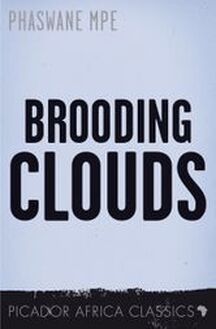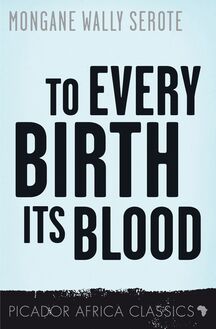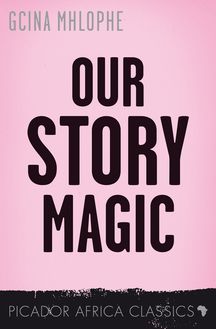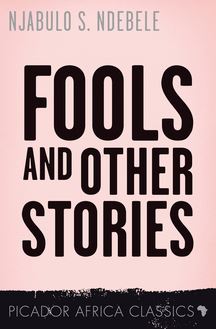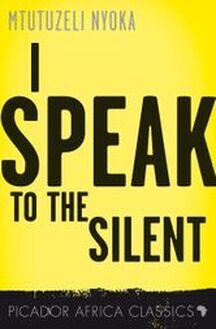-
 Univers
Univers
-
 Ebooks
Ebooks
-
 Livres audio
Livres audio
-
 Presse
Presse
-
 Podcasts
Podcasts
-
 BD
BD
-
 Documents
Documents
-
- Cours
- Révisions
- Ressources pédagogiques
- Sciences de l’éducation
- Manuels scolaires
- Langues
- Travaux de classe
- Annales de BEP
- Etudes supérieures
- Maternelle et primaire
- Fiches de lecture
- Orientation scolaire
- Méthodologie
- Corrigés de devoir
- Annales d’examens et concours
- Annales du bac
- Annales du brevet
- Rapports de stage
La lecture à portée de main
Vous pourrez modifier la taille du texte de cet ouvrage
Découvre YouScribe en t'inscrivant gratuitement
Je m'inscrisDécouvre YouScribe en t'inscrivant gratuitement
Je m'inscrisEn savoir plus
Vous pourrez modifier la taille du texte de cet ouvrage
En savoir plus

Description
Walter Hambile Kondile is the typical ‘good native’ of his generation, poorly educated and subservient, brought up to know his place and believe that ‘it was God’s design for the white man to rule over me’.
Then Kondile’s beloved daughter, Sindiswa, a young struggle activist, goes missing in exile. Kondile’s search leads him to Lesotho and grim discoveries of betrayal that shatter forever his own ‘complicity of silence’, committing him to an irrevocable path of no return.
This is a compelling and beautifully written novel by Mtutuzeli Nyoka, a powerful storyteller who tells his history as he sees it.
Sujets
Informations
| Publié par | Pan Macmillan South Africa |
| Date de parution | 01 août 2014 |
| Nombre de lectures | 0 |
| EAN13 | 9781770103658 |
| Langue | English |
Informations légales : prix de location à la page 0,0391€. Cette information est donnée uniquement à titre indicatif conformément à la législation en vigueur.
Extrait
About Picador Africa Classics
The Picador Africa Classics imprint, launched in 2014 by Pan Macmillan South Africa, aims to build a catalogue of exceptional titles that may be out of print or lack presence in digital form. It builds on the historical concept of something like the African Writers Series as well as a publisher such as Ravan Press, which showcased works of excellence by African writers.
As a leading South African publisher, Pan Macmillan’s initial focus is on classics of South African literature, both fiction and non-fiction, but we hope to expand this to writers from other countries on the African continent.
Mtutuzeli Nyoka served as the President of Cricket South Africa (CSA) from 2008 to 2011. He currently lives in Johannesburg where he practises as an Ear, Nose and Throat surgeon. His first novel, I Speak to the Silent , was published in 2004 by UKZN Press to widespread critical acclaim, and his second novel A Hill of Fools was published in April 2013 by Picador Africa.
I Speak to the Silent
Mtutuzeli Nyoka
PICADOR AFRICA
First published in 2004 by University of KwaZulu-Natal Press
This ebook edition published in 2014 by Picador Africa Classics
an imprint of Pan Macmillan South Africa
Private Bag X19, Northlands Johannesburg, 2116
www.panmacmillan.co.za
e-ISBN 978-1-77010-365-8
© in the text Mtutuzeli Nyoka 2004
© in the editorial matter and final arrangement Pan Macmillan South Africa (Pty) Ltd 2014
All rights reserved. No part of this publication may be reproduced, stored in or introduced into a retrieval system, or transmitted in any form or by any means (electronic, mechanical, photocopying, recording or otherwise), without the prior written permission of the publisher. Any person who does any unauthorised act in relation to this publication may be liable to criminal prosecution and civil claims for damages.
This book is a work of fiction. Any resemblanceto actual persons, living or dead, is purely coincidental.
Original editing by Elana Bregin
Cover design of this edition by K4
To my children:
my son uSiyolo and my beautiful daughter uNonceba,
with all my love.
Contents
Chapter 1
Chapter 2
Chapter 3
Chapter 4
Chapter 5
Chapter 6
Chapter 7
Chapter 8
Chapter 9
Chapter 10
Chapter 11
Chapter 12
Chapter 13
Chapter 14
Chapter 15
Chapter 16
Chapter 17
Chapter 18
Chapter 19
1
O n a rainy day in my fifth year in prison, I received a note from a Mr John Smith. He wanted to meet with me. I could see the ocean, dark and brooding. The waves undulated as if excited by the falling rain and the clouds hung low and menacing. I was deep in thought, my mind swirling with sad memories. I had received similar requests before. At first they would send a sudden gust, a ripple of excitement, through my body. Later, they became a source of annoyance and irritation.
A young coloured warder brought the note to me. He was very polite. He must have been new. Politeness was rare in prison. The warders mostly believed that to handle animals effectively you must be one yourself. I was consequently terrified of them. Their moods ranged from indifferent to callous, and their behaviour, from strange to downright wicked. The prison jungle that was our home could pollute the mind and soul of even the most decent human being. Some of the warders enjoyed using their batons. Indeed, much of their authority lay in their willingness to use these weapons. Sometimes they used other prisoners, the most violent, to do their dirty work. The collusion between the prisoners and officials made prison life not only unsafe but also unpredictable.
‘This is yours, meneer,’ the young warder said demurely, as he handed me the neat blue envelope. Like all the mail we prisoners received, it had been opened. Even though my long stay in prison had earned me certain privileges, privacy was not one of them. I read the letter from John Smith with absolute indifference. I did not realise that it marked the beginning of one of the most intimate relationships of my life.
Perhaps, I thought, it was from one of those lazy reporters looking to rehash an old story for tomorrow’s headline. Or was it a student from the university, seeking to impress his professor with an assignment teeming with ghoulish details? Or some idiot simply curious to know what I looked like?
Prisoners have a lot of time on their hands. Often, they welcome visits, even from fools, just to break the monotony. However, I was fortunate and had received many visitors during my prison stay. I was, after all, the famous prisoner – or rather, the infamous murderer of Raymond Mbete; ‘Comrade Ray’, as many called him.
Comrade Ray had been strangled to death. Someone strong – and I am strong – had put his hands around Mbete’s scrawny neck, firmly and long enough to squeeze the life from it. When the police arrived, they found him dead with his face submerged in his own vomit. Like most people who die in this fashion his pants were urine-soaked and soiled.
A fitting finale for a monster. A man as devoid of scruples as of morals.
Mbete was, however, the people’s hero. Blind idolatry was the curse of my people.
I remember the day of the judgement. It was a hot summer day. Not that this meant anything to me, because it was the day on which my fate was decided. I had slept poorly for several days and felt tired, almost indifferent to the scene around me. There was not a single empty seat inside the courtroom, the crowd a mixture of political activists with slogans branded on their shirts, and the merely curious. People even sat on the floor. The heat inside the courtroom was intense, though all the windows were open.
Outside was a surging, chanting mass of humanity, angry and animated in their quest for justice – or was it lust for blood?
‘Intambo – the noose!’ The call rang out repeatedly.
My people were begging for my blood, in a manner similar to the Roman crowds in the Colosseum of old. They were begging Caesar to raise his hand and give the signal for my execution. Caesar, in my case, was the Judge Boschoff. He passed the sentence without sympathy.
‘You have been tried before this court and found guilty of premeditated murder. You have been charged and convicted of the cold-blooded murder of an innocent man, a father as well as a husband. What goes on in the hearts and minds of men like you, I cannot divine. You are a viper in human clothing. Your vile deeds are a black stain on our community. I therefore sentence you to spend the rest of your life in prison.’
The judge’s face was an angry, quivering red. I heard every one of his words and felt their full force. He rose from his bench looking self-satisfied and left the court with a flourish. The show had come to an end. It was concluded by a judge, Judge Boschoff, whom I knew to have no respect for either justice or human life. The same judge, in this very courtroom, had set a white man free for killing a native whose mongrel dog had mated with his alsatian. It was this very judge who disparaged a black woman who had been raped by a farmer and his four sons. The same judge who set free a white man for burning an old native woman who had failed to pay rent. To the native, Judge Boschoff was a cruel and unsympathetic scourge.
I was disgusted by his hypocrisy. I felt like emptying my bladder on the bald patch on top of his head. However, the judge was the hero on that day. I could hear my wife, Nomsa, crying in the background, her sobs all but drowned out by the jubilant chants from the public gallery. Turning my head, I witnessed a scene of unfolding madness. Seldom had I seen so much passion and joy from my people before.
‘Intambo!’ Some of the crowd were still clamouring for the ultimate sentence.
Hirschberg, my lawyer, put his chubby hand on my shoulder and said: ‘It’s not over yet.’ He had a strange accent and I always struggled to make out what he was saying. I was quickly surrounded by the police and taken away. For the second time in my life I was going to prison, and this time around for a very long spell.
In prison I lived for a long while surrounded by hatred. I lost count of the number of times I was spat on. The smell and taste of spit were my constant companions. Other prisoners seldom spoke to me. When they did, it was frequently with invective. Despite the profusion of threats I was never physically molested. Even more significantly, I was not sexually molested. I remember musing over this and wondering how I had escaped this fate. It happened to so many around me. The threat was made often but, thankfully, never carried out.
They called me ‘old chick’ or ‘ou pussy’ but never went further than that. Perhaps, I thought, even prison perverts have their own vile standards to uphold. They probably had no wish to defile themselves with an old traitor like me. Over time I had inured myself to hatred and hostility. I even came to appreciate these reactions for the space and solitude they provided. The bullies got tired of spitting at me. The perverts turned their attention to other prison ‘maidens’.
My fortunes had indeed changed. I was no longer the master of my own house but prisoner KL128467. I was told when to sleep, when to wake and when to eat. My daily dress was a green shirt and long green pants. This was standard prison uniform. I was no longer surrounded by loving relatives but by rabble; robbers, rapists, murderers and a miscellany of other scoundrels. Prison was teeming with psychopaths of all kinds. In such an environment, you find yourself prey to all manner of anxieties.
Contraband found a ready market here. There was a thriving trade in dagga and alcohol. Some of the warders were the major benefactors of this. They had to be paid fo
-
 Univers
Univers
-
 Ebooks
Ebooks
-
 Livres audio
Livres audio
-
 Presse
Presse
-
 Podcasts
Podcasts
-
 BD
BD
-
 Documents
Documents
-
Jeunesse
-
Littérature
-
Ressources professionnelles
-
Santé et bien-être
-
Savoirs
-
Education
-
Loisirs et hobbies
-
Art, musique et cinéma
-
Actualité et débat de société
-
Jeunesse
-
Littérature
-
Ressources professionnelles
-
Santé et bien-être
-
Savoirs
-
Education
-
Loisirs et hobbies
-
Art, musique et cinéma
-
Actualité et débat de société
-
Actualités
-
Lifestyle
-
Presse jeunesse
-
Presse professionnelle
-
Pratique
-
Presse sportive
-
Presse internationale
-
Culture & Médias
-
Action et Aventures
-
Science-fiction et Fantasy
-
Société
-
Jeunesse
-
Littérature
-
Ressources professionnelles
-
Santé et bien-être
-
Savoirs
-
Education
-
Loisirs et hobbies
-
Art, musique et cinéma
-
Actualité et débat de société
- Cours
- Révisions
- Ressources pédagogiques
- Sciences de l’éducation
- Manuels scolaires
- Langues
- Travaux de classe
- Annales de BEP
- Etudes supérieures
- Maternelle et primaire
- Fiches de lecture
- Orientation scolaire
- Méthodologie
- Corrigés de devoir
- Annales d’examens et concours
- Annales du bac
- Annales du brevet
- Rapports de stage

